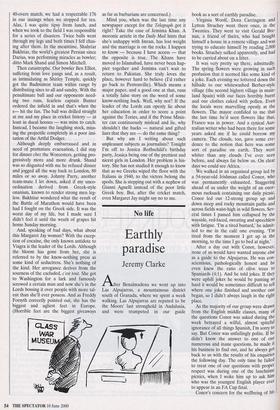No life
Earthly paradise
Jeremy Clarke
After Benalmadena we went up into Las Alpujarras, a mountainous district south of Granada, where we spent a week walking. Las Alpujarras are reputed to be the Moors' last stronghold in Andalusia, and were trumpeted in our guide book as a sort of earthly paradise. Virginia Woolf, Dora Carrington and Lytton Strachey went there once, in the Twenties. They went to visit Gerald Bre- nan, a friend of theirs, who had bought himself a house in a remote village and was trying to educate himself by reading 2,000 books. Strachey sulked apparently, and had to be carried about on a litter.
It was very pretty up there, admittedly. The spring flowers were growing in such profusion that it seemed like some kind of a joke. Each evening we tottered down the hillside to our whitewashed Berber-style village (the second highest village in main- land Spain) with our faces horribly burnt and our clothes caked with pollen. Even the locals were marvelling openly at the flowers. The mayor confided to me that the last time he'd seen flowers like that, Franco was in power. And a cynical Aus- tralian writer who had been there for some years asked me if he could borrow my camera. The clouds, too, gave some cre- dence to the notion that here was some sort of paradise on earth. They were whiter than any clouds I've ever seen before, and always far below us. On clear days we could see Africa.
We walked in an organised group led by a 54-year-old Irishman called Conor, who was permanently exhausted. Staggering ahead of us under the weight of an enor- mous rucksack containing our daily picnic, Conor led our 12-strong group up and down steep and rocky mountain paths and across fields waist-high in wild flowers. Sev- eral times I passed him collapsed by the wayside, red-faced, sweating and speechless with fatigue. 'I'm a tired bastard,' he admit- ted to me in the café one evening. 'I'm tired from the moment I get up in the morning, to the time I go to bed at night.'
After a day out with Conor, however, none of us would have wanted anyone else as a guide to the Alpujarras. He was con- scientious, pathologically honest and he even knew the ratio of olive trees to Spaniards (4:1). And he told jokes. If they were uphill jokes he would be panting so hard it would be sometimes difficult to tell where one joke finished and another one began, so I didn't always laugh in the right place.
As the majority of our group were drawn from the English middle classes, many of the questions Conor was asked during the week betrayed a wilful, almost spiteful ignorance of all things Spanish, I'm sorry to say. But Conor was unfailingly polite. If he didn't know the answer to one of our numerous and inane questions, he made it his business to find out, and he always got back to us with the results of his enquiries the following day. The only time he failed to treat one of our questions with proper respect was during one of the lunchtime picnics, when I woke him up to ask hint who was the youngest English player ever to appear in an FA Cup final. Conor's concern for the wellbeing of his group extended well beyond the daily walk. Immediately after a walk, for example, he would take us all back to his 600-year-old cottage, give us wine, and encourage us to use his toilet. On the first night he also took us all out to a smoky little drinking club to see flamenco. It was genuine fla- menco too, none of your tourists' stuff. But there was no duende. The majority of our group were far too caught up in their own class, culture and language to appreciate the efforts of a couple of stamping gypsies, and we just sat there like a row of gar- goyles. Most of us didn't even clap. At the height of the performance a lady from the Cotswolds stood up and carefully took a photograph. I don't think the gypsies had seen anything quite like it before. By the end of the week, however, we had begun to loosen up a bit. On the third day somebody had asked me what I did for a living, and on the fourth day, when we were nearing the summit of Mount Mulhacen which is the highest peak in Spain inciden- tally — somebody else generously passed round his bag of Werthers Originals. But it wasn't till the very last day, when the lady from St Leonards on Sea didn't appear because she'd been on the lavatory all night suffering from food poisoning, that we really gelled as a group. There's nothing like news of somebody else going down with the trots to draw English people together, I always find. My, how we laughed!

































































 Previous page
Previous page